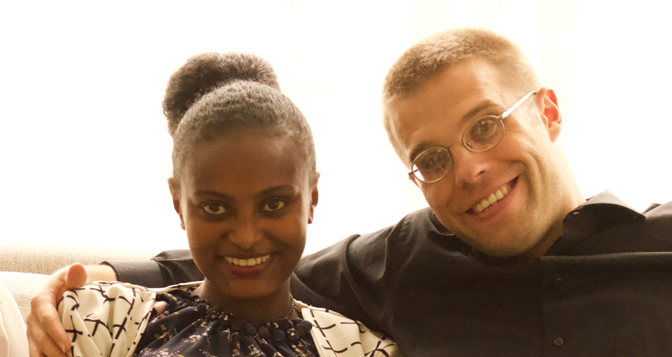A disabled girl on the streets of Addis taught me the revolutionary power of neighbor love.
When I was a pastor at Beza International Church in 2005, I started a simple practice that changed my life. Rather than taking a taxi to work, I committed to walking on foot. My purpose was to save my taxi money and buy bread-and-banana meals for the street children on Africa Avenue, the road through Addis’s downtown. I wanted to get to know these kids and not pass them by.
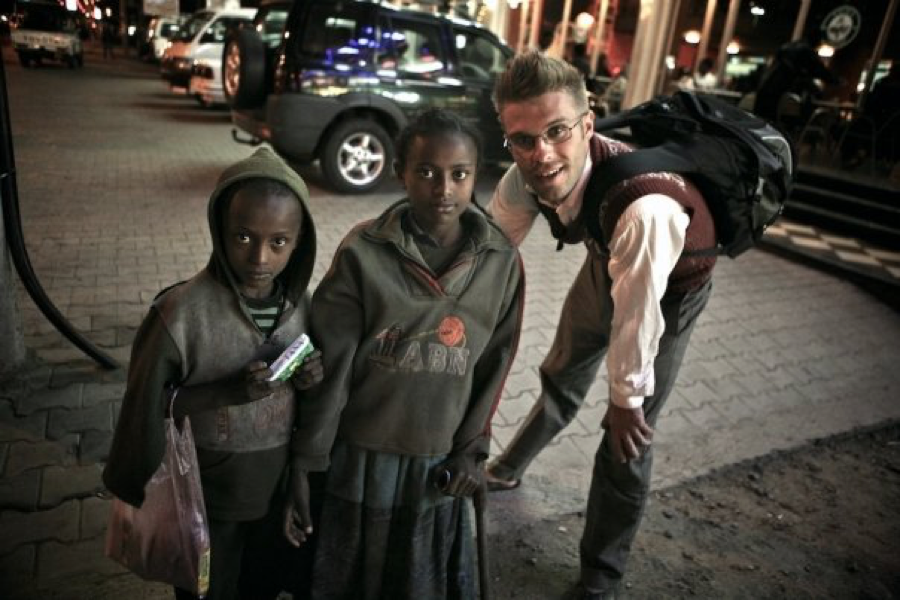
With Wude and Yoni in 2007
As I walked day after day, I met a little girl named Wudenesh, whose name means “You Are Precious.” Wude was always with her even smaller brother Yonas. She walked slowly with the assistance of a clanky cane and sold sticks of gum, tissues, and cigarettes from a cardboard tray.
Wude’s legs were badly disabled and her back was deformed. Seeing this vulnerable little girl working on the streets after dark broke my heart. She was younger and smaller than my beloved niece Kayla back home. But there she was on the street.
I met Wude and Yonas many times on my way to and from church, and I was always taken by Wude. Her eyes had a strength, sorrow, and love that grasped my heart.
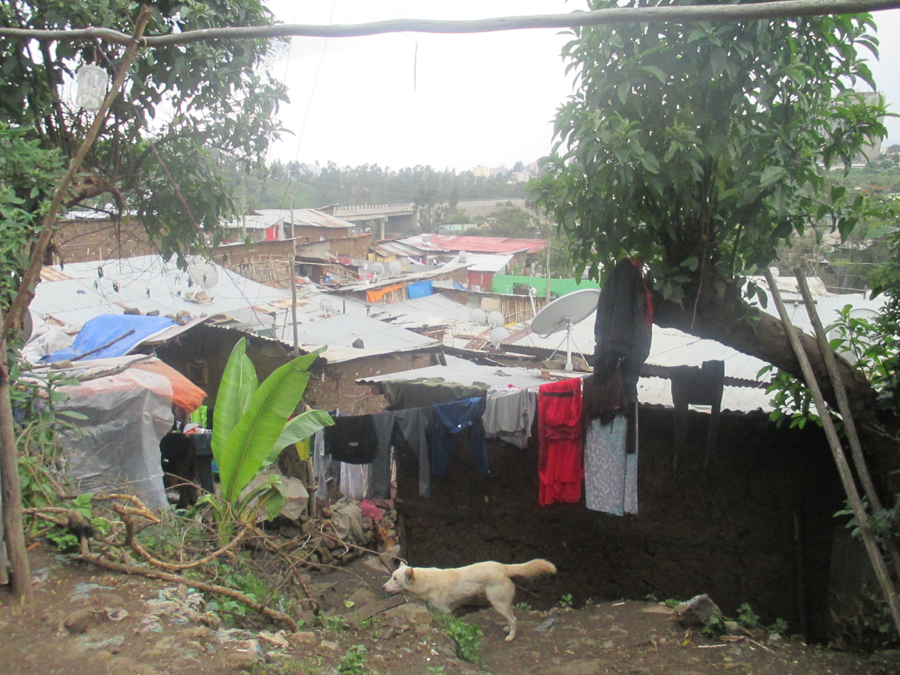
Wude’s neighborhood in Addis Ababa
After some time – far too long, really – I took another step that changed my life. I asked Wude to take me to her house. I wanted to meet her family and learn her story. Together with her mother Itash, we walked slowly off Africa Avenue, squeezed into a crowded minibus, and carefully struggled down a muddy hill into her neighborhood.I was astonished by what I discovered.
Her six-member family lived in a one-room mud shack with one bed in the bowels of the Bole Mikael slum. The neighborhood is named after the archangel Michael and located near a filthy river. Wude’s father was a gaunt, HIV+ man who worked as a security guard. Her mother Itash – beautiful and shy like her daughter – baked injera, Ethiopia’s daily bread. This is how they eked out survival. Wude had another younger brother named Belay (“Great One”) and a little sister named Alemtsehay (“World’s Sun”). The family later adopted a young boy named Alazar (Lazarus) whose mother could no longer take care of him.
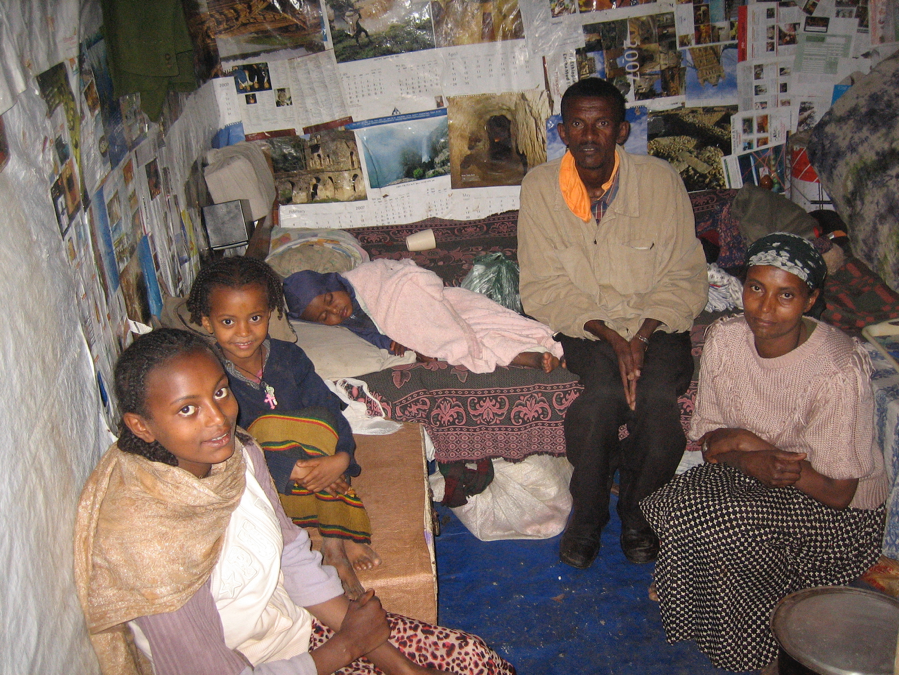
Meeting Wude’s family for the first time in their one-room home
The family had migrated to Addis years before from rural Ethiopia seeking medical help for Wude’s bone TB. Their move was filled with hope and heartbreaking tragedy. Wude was given a bad injection at Black Lion, the government hospital in Addis, and this mistake left her nearly paralyzed from the waist down. After the injection, the doctor told her not to worry. He assured her that she would regain feeling in her legs soon. But her legs never recovered, and her life was changed forever. Sadly, this nightmarish medical story is all too common in Ethiopia.
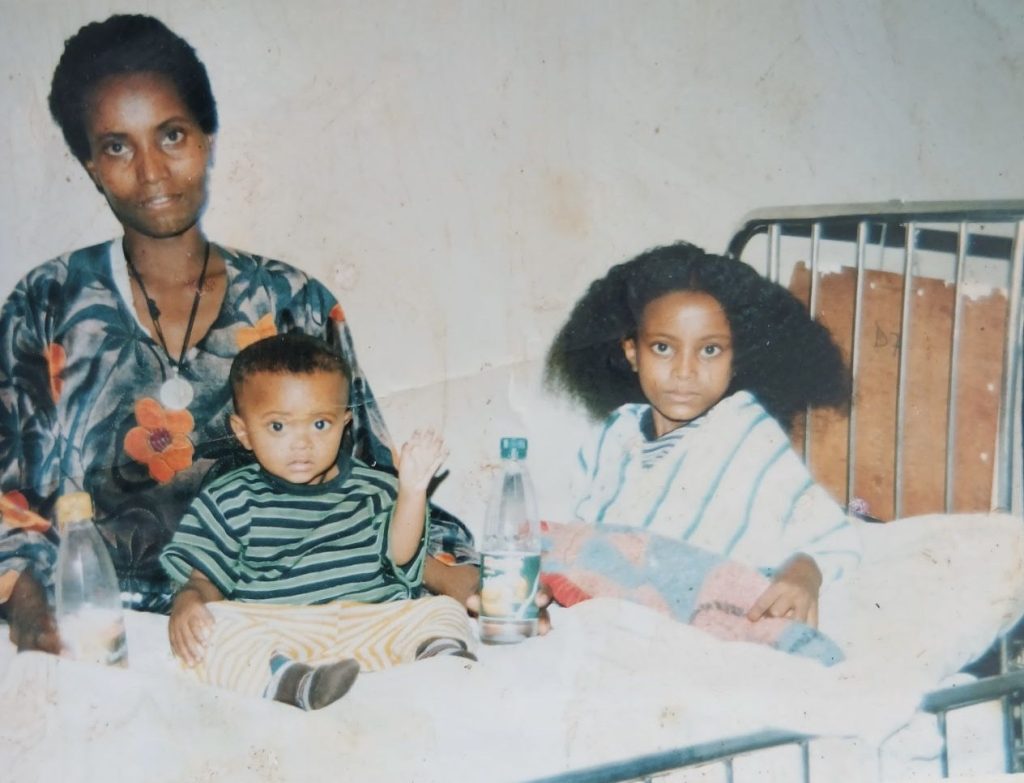
Wude in the Black Lion Hospital with her mom and brother
Amidst this extreme poverty, disease, and tragedy, I discovered that Wude was brilliant.
Despite living in a one-room shack, being physically disabled, and working the streets at night, she managed to finish school in the top of her class year after year. Her parents pulled out an envelope and showed me her official grade reports with pride and glowing faces.
As I made more visits deep into Bole Mikael, our hearts were woven together. We became part of one another’s lives. We became neighbors, even though we lived in different parts of the city and communicated across a language barrier. We started celebrating birthdays and holidays together.
Later in 2009, the family told me they were going to be evicted, because they didn’t have enough money to cover their property fees. Thankfully, my friends and I were able to raise the $350 they needed, and their humble home was saved. In fact, we raised extra money, and they were able to build a second room.
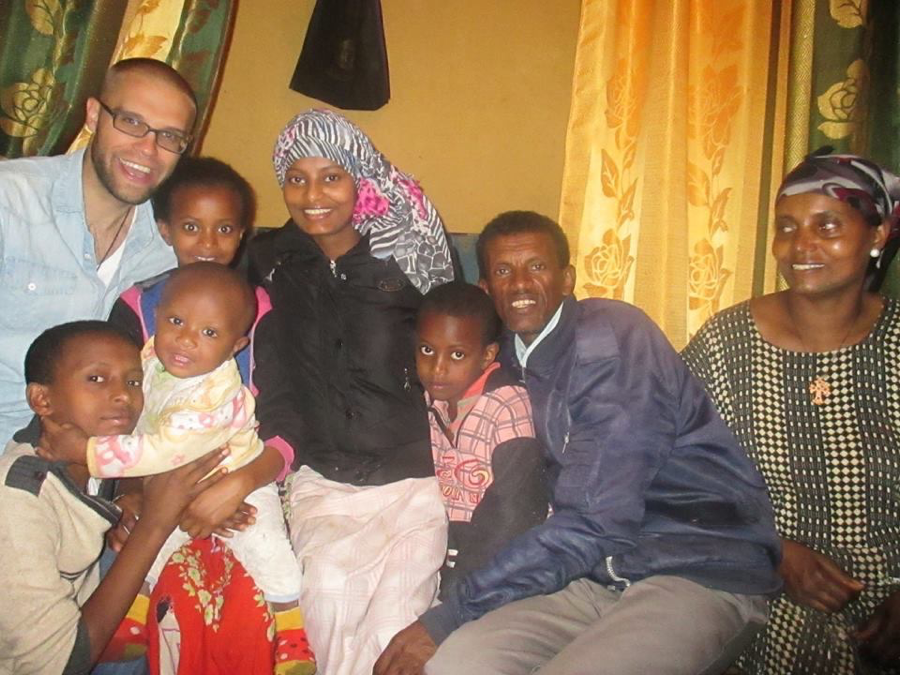
An afternoon together at home in 2019
On Easter Sunday 2010, Lily and I celebrated our engagement with Wude’s family – a rare year when American and Ethiopian Easters fell on the same day. I wanted them to be the first witnesses of our covenant when I got down on my knee and asked Lily to marry me. They embody for us what our marriage must always be about: neighbor-love with precious but impoverished people and the hope of resurrection.
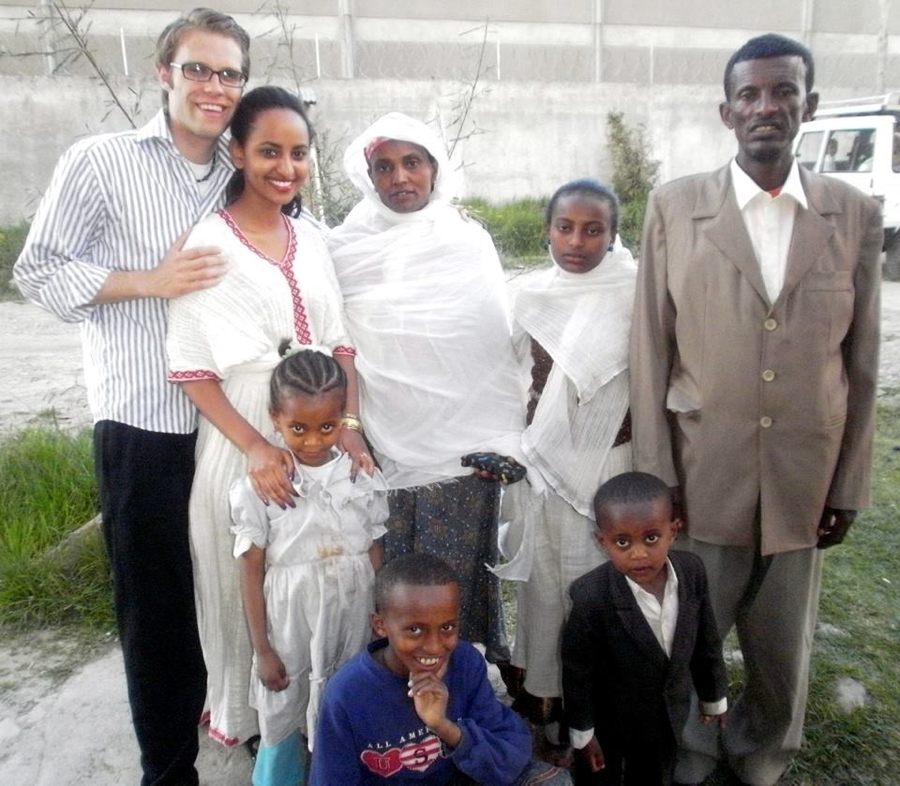
Lily’s and my engagement on April 4, 2010 with Wude and her family
Starting in 2014, Wude’s mom Itash has warmly welcomed my Wheaton College and University of Bonn students into her tiny but loving home. Itash and her family have become generous hosts and inspiring professors now for over fifty American and German university students. Despite my protests, Itash stubbornly cooks lavish meals for us and shares about her life as we all cram into her living room to talk. We have become family since we met twenty years ago. But I’m still moved every time Itash tells my students about her gratitude for a simple cup of coffee in the morning and how she thanks God for each day of life – and how she prays for me.

Wheaton College students visit Wude’s home and enjoy lunch with her mom Itash in 2016
In 2016, Wude had a major surgery on her back. With the help of metal rods and bolts, she is now able to stand erect, though still with the support of a cane. As I sat at her hospital bed and helped her take some of her first steps, she told me that her life is the story of my book Bonhoeffer’s New Beginning: new beginnings after devastation. Her endurance and determination – one foot in front of the other – endlessly inspire and challenge me.
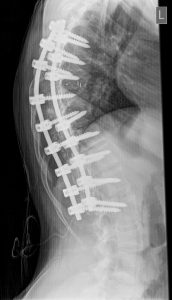
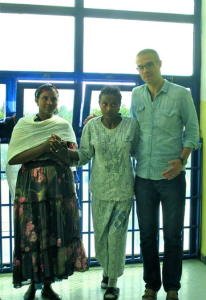
From the start, I personally committed to sending Wude to a private school on one condition: that she would no longer be sent out to work at night. Unsurprisingly, Wude continued to flourish in her studies through high school, and Wude earned all A’s on her national matriculation exam – a major accomplishment that we celebrated over an Italian dinner with our dear friend Muluken.
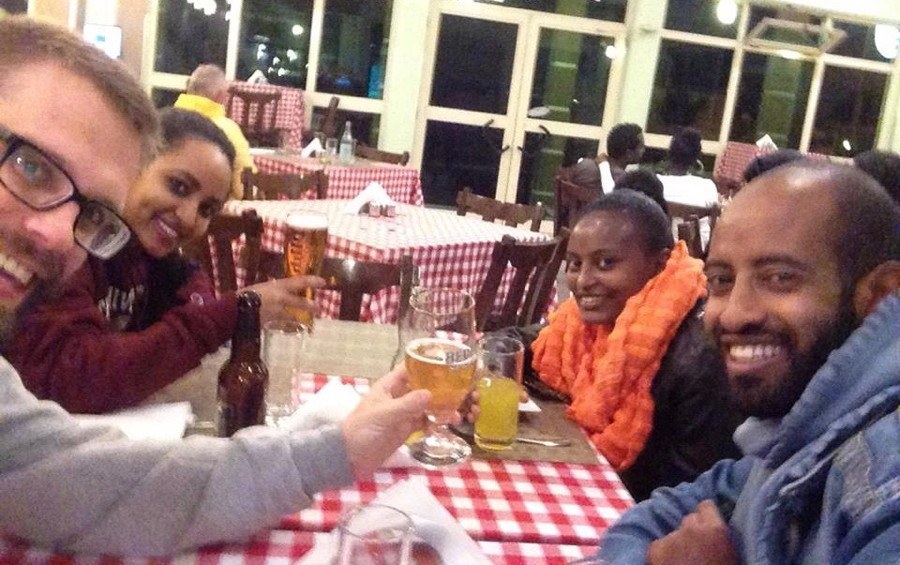
Celebrating Wude’s stellar matriculation exam score in 2016
Over the following years, Wude worked hard at her studies. She refused to give up and overcame many challenges. Finally, in February 2025, Wude accomplished one of her dreams. She graduated from St. Mary’s University in Addis Ababa with a B.A. in Marketing.
On that joyous day, like the first day I met Wude, her brother Yonas was standing by her side, though now a head taller! Wude texted me that weekend, “God and my parents helped me a lot. My mom is wonder woman. You listened to me and told me I am strong. My internal motivation, hope to change myself, and friends with disabilities also helped me make it to today.”
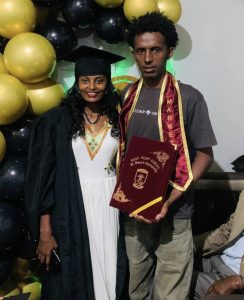
Wude and Yonas celebrating her graduation with family
Moving forward, Wude’s dream is to get a job in social work and motivate people with disabilities to accomplish their own dreams. She wants to tell her story, continue physical therapy, and coach others into their purpose. I believe she can do it. She never gives up.
 Why am I telling Wude’s inspiring story?
Why am I telling Wude’s inspiring story?
Through a simple practice of neighbor love – walking to work, seeing kids on the street as neighbors, buying them meals, and visiting their home – our lives have been mutually, abundantly enriched and transformed.
On the one hand, I made new friends, was inspired by their strong faith and powerful endurance, and got to introduce them to others who have also been inspired and challenged. We’ve shared countless meals, birthdays, and holidays together. My life has been immeasurably enriched, and Lily’s and my marriage will always be woven together with their friendship.
On the other hand, Wude’s house was saved and expanded. She got off the streets and has had the resources to make it to university, excel in her studies, and graduate. Wude and her family have made new friends and had the dignity of speaking as respected teachers to my students. We share joy and hope, tears and laughter across the chapters of our lives.
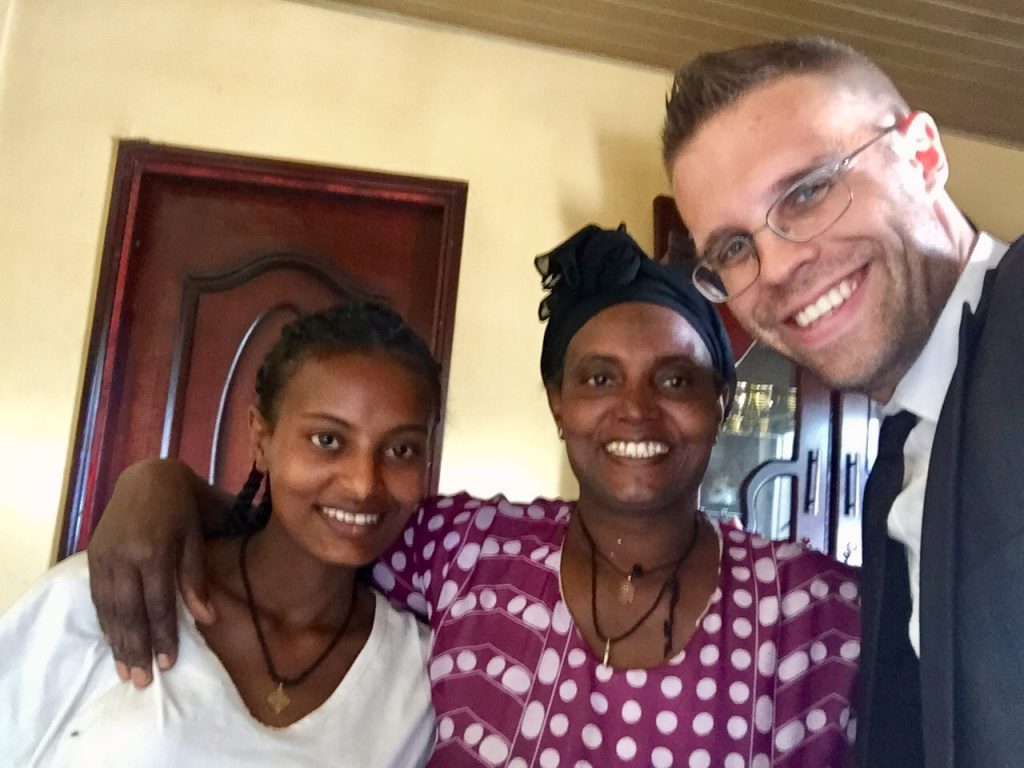
New beginnings in 2020
Our love for one another has gladdened and enriched our lives in a two-way relationship like neighbors do. I needed Wude and her family, and she and her family also needed me. Neighbor love is what brought us together, now for twenty years.
“What if?” is a powerful question that opens our imaginations to a new future.
What if we saw each and every person on our path as a neighbor, as someone precious, especially the ones that are most vulnerable and easiest to overlook?
What if every follower of Jesus walked their own Africa Avenue and committed to building a loving relationship with just one suffering neighbor on their path?
What if every one of us was graced with the gift of Wudenesh – You Are Precious – in our lives?
What if simple but life-changing practices of neighbor-love like walking to work became the commonsense culture of our faith in Addis, Chicago, and around the world – as commonsense as going to church or talking to God?
This neighbor love wouldn’t be about paternalistic pity but mutual respect as equal people. It wouldn’t be about savior-complex heroism but small acts of humanity. It wouldn’t be about guilt but the joy of sharing our lives in the ways we can with all of their glory, pain, and ordinariness.
What if neighbor love?
It wouldn’t always be easy. It hasn’t for us. Mistakes and hard times are inevitable. But our neighbors would suffer a little less, and our lives would be mutually enriched by the sharing of our love – our time, attention, relationships, resources, and much beyond as equal and beloved people.
We might even find that our lives are saved and healed in ways we could never imagine before. Jesus said, “Whatever you do for the least of these, you do for me” (Matthew 25:31-46). Bonhoeffer said it like this: “Jesus Christ, God himself, speaks to us from every human being.” Neighbor love is Christ love, and Christ love is neighbor love. They are windows and ways to one another. That has been my experience, and it has been healing.
In my new book Reviving the Golden Rule: How the Ancient Ethic of Neighbor Love Can Heal the World, I tell the story of how neighbor love originated, evolved, and how we can embody it today. I had Wudenesh and her strong family – Itash, Tilahun, Yonas, Alemtsehay, Belay, and Alazar – in my heart as I wrote it. They have become my teachers and friends – my beloved neighbors. This book would not have been possible without their love and inspiration over two decades. (Itash randomly called me to come have coffee at their home when I was originally writing this story in 2019!)
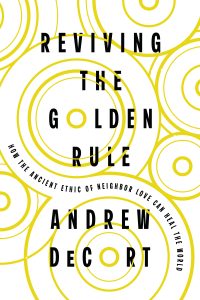
Together, we can discover the gifts of sacred presence, transformative learning, and practical service with and for our neighbors. Together, we can discover that every person is precious, even the ones that are most despised and rejected by society. Together, our love can overwhelm the numbing sorrow of poverty and bring good news to our socities.
I’ve seen it for myself with Wude and her family: neighbor love is a revolutionary ethic that can heal our world.
What is a small step that you can take today to embody neighbor love in your own life?
Step out.
You won’t regret it.
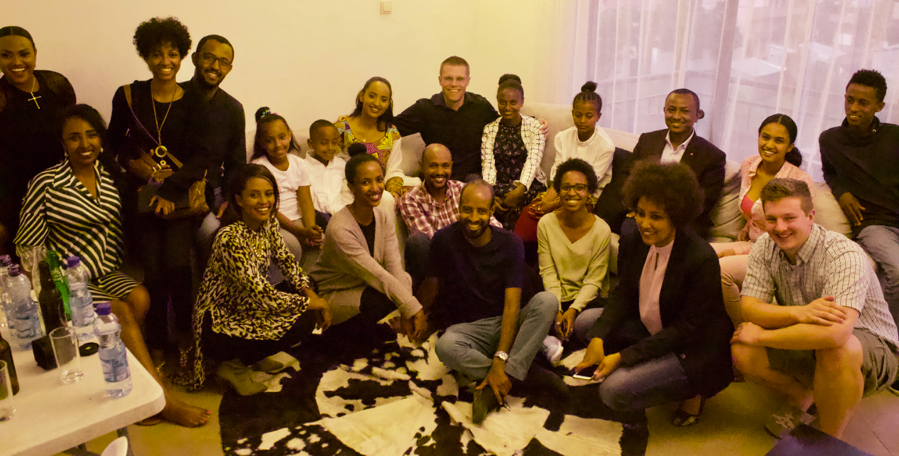
With Wude, Lily, and our friends in Addis
This story was shared with the permission of Wudenesh and her family. I originally published it in March 2019 and lightly updated it in May 2025.



